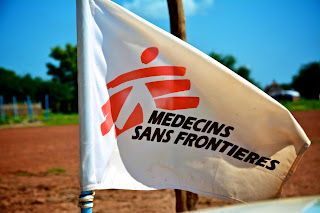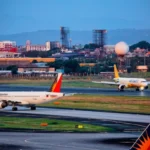
MSF in Agok, South Sudan.South Sudan faces many challenges, including ongoing conflict, displacement, food shortages/malnutrition, lack of social services including health care, and insecurity. MSF hospitals have been under attack from different armed groups, putting the medical staff and patients at risk.
Doctors Without Borders (MSF), also known as Médecins Sans Frontières in France, is an international humanitarian organization dedicated to providing medical care to people in need, including victims of political violence and natural disasters. The populations served by the organization frequently lack access to or adequate resources for medical treatment. The group received the Nobel Peace Prize in 1999.
Doctors Without Borders was founded in 1971 by 13 doctors and journalists who were dissatisfied with the Red Cross’s neutrality. The founding members believed that people in need had the right to medical care and that the need to help those people transcended national boundaries. They also felt obligated to speak out against injustice, even if it meant offending host governments.
Doctors Without Borders conducted its first major relief effort in 1972, assisting earthquake victims in Nicaragua. Other significant missions followed, including care for combat victims in Lebanon (1976), Afghanistan (1980), and the Russian republic of Chechnya (1995). Doctors Without Borders has continued to work in many countries around the world to alleviate famine, provide medical care to war victims, and assist refugees. Doctors Without Borders was a founding partner in the Drugs for Neglected Diseases Initiative (DNDi) in 2003, which works to develop medicines for diseases such as malaria, tuberculosis, and HIV/AIDS. The organization has been instrumental in providing care to victims of disease outbreaks.
Doctors Without Borders operates in nearly 80 countries and has offices in several others. Doctors Without Borders has a reputation for being a highly politicized organization that is particularly adept at gaining publicity for its efforts. Its outspoken opposition to perceived injustice has resulted in its expulsion from a number of countries.
The United Nations Economic and Social Council has granted MSF general consultative status. It was awarded the Nobel Peace Prize in 1999 in recognition of its members’ ongoing efforts to provide medical care in times of crisis and to raise international awareness of potential humanitarian disasters. MSF’s president at the time, James Orbinski, accepted the award on behalf of the organization. MSF had previously received the Seoul Peace Prize in 1996. Christos Christou took over as international president in June 2019, succeeding Joanne Liu.
Before establishing a field mission in a country, an MSF team visits the area to assess the nature of the humanitarian emergency, the level of safety in the area, and the type of aid required (this is called an “exploratory mission”).
Most missions’ primary goal is to provide medical assistance, though some missions also provide assistance in areas such as water purification and nutrition.
Vaccination campaigns are an important component of the medical care provided by MSF missions. Vaccination can prevent diseases such as diphtheria, measles, meningitis, tetanus, pertussis, yellow fever, polio, and cholera, all of which are uncommon in developed countries. Some of these diseases, such as cholera and measles, spread quickly in large populations living in close proximity, such as in a refugee camp, and hundreds or thousands of people must be immunized in a short period of time. In 2004, for example, approximately 50,000 residents in Beira, Mozambique, received an experimental cholera vaccine twice in about one month.
AIDS treatment (with antiretroviral drugs), AIDS testing, and education are all important components of the medical care provided during MSF missions. MSF is the only source of treatment for many African countries, whose citizens account for the vast majority of HIV and AIDS patients worldwide. Because antiretroviral drugs (ARVs) are not widely available, MSF usually treats opportunistic infections and educates the public on how to slow disease transmission.
MSF improves the capabilities of local hospitals in most countries by improving sanitation, providing equipment and drugs, and training local hospital staff. When the local staff is overburdened, MSF may open new specialized clinics for endemic disease treatment or surgery for war victims. These clinics are started by international staff, but MSF works hard to train and supervise local staff so that they can run them themselves. MSF educates the public about reproductive health care and venereal disease in some countries, such as Nicaragua.
Because the majority of the areas where field missions are needed have been affected by a natural disaster, civil war, or endemic disease, the residents often require psychological support as well. Although the presence of an MSF medical team may reduce stress among survivors, people with depression, survivors of domestic violence, and those with substance use disorders are often helped by a team of psychologists or psychiatrists. Doctors may also train local mental health professionals.
In 2014, MSF collaborated with satellite operator SES, other NGOs Archemed, Fondation Follereau, Friendship Luxembourg, and German Doctors, as well as the Luxembourg government, on the pilot phase of SATMED, a project to bring eHealth and telemedicine to remote areas of developing countries using satellite broadband technology. SATMED was first used in Sierra Leone to aid in the fight against Ebola.








